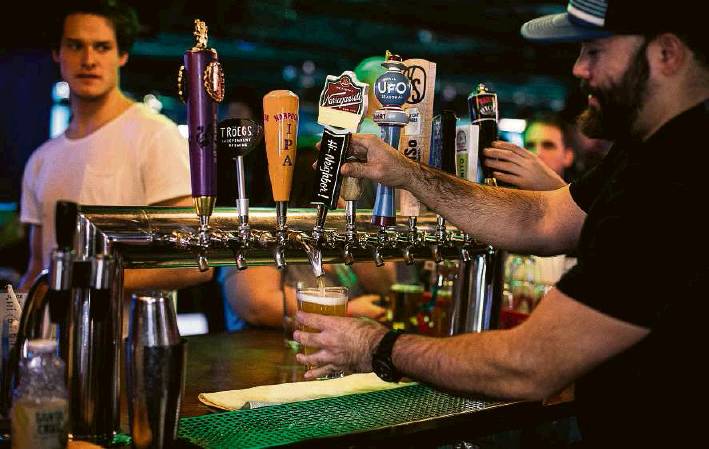Industry funds study on alcohol benefits
Project to research effects of drinking as part of daily lifestyle
By Roni Caryn Rabin NEW YORK TIMES
It was going to be a study that could change the American diet, a huge clinical trial that might well deliver all the medical evidence needed to recommend a daily alcoholic drink as part of a healthy lifestyle.
That was how two prominent scientists and a senior federal health official pitched the project during a presentation at the Breakers Hotel in Palm Beach, Fla., in 2014. And the audience members who were being asked to help pay for the $100 million study seemed receptive: They were all liquor company executives.
The 10-year government trial is underway, and Anheuser Busch InBev, Heineken and other alcohol companies are picking up most of the tab, through donations to a private foundation that raises money for the National Institutes of Health, a federal agency.
The alcohol study is overseen by the National Institute on Alcohol Abuse and Alcoholism, one of 27 centers under the NIH. The lead investigator and NIH officials have said they never discussed the planning of the study with the industry. But a different picture emerges from emails and travel vouchers obtained by The New York Times, as well as from interviews with former federal officials.
The documents and interviews show that the institute waged a vigorous campaign to court the alcohol industry, paying for scientists to travel to meetings with executives, where they gave talks strongly suggesting that the study’s results would endorse moderate drinking as healthy.
An NIAAA official, now retired, said she followed up after the presentations with appeals for money, telling industry executives the research could not be done without their support.
Questionable presentations
The meetings in late 2013 and early 2014 included a “working lunch” at the Beer Institute convention in Philadelphia, and two meetings at the Washington headquarters of the Distilled Spirits Council, a liquor industry trade group.
Dr. Kenneth J. Mukamal, an associate professor of medicine at Harvard Medical School and lead investigator of the study, and Dr. John Krystal, a Yale University neuroscientist, argued that a long-term randomized controlled trial could dispel lingering doubts about the benefits of moderate daily drinking.
“A definitive clinical trial represents a unique opportunity to show that moderate alcohol consumption is safe and lowers risk of common diseases,” said one slide in the scientists’ presentation at the Breakers. “That level of evidence is necessary if alcohol is to be recommended as part of a healthy diet.”
The fundraising may have violated NIH policy, which prohibits employees from soliciting or suggesting donations, funds or other resources intended to support activities. The campaign is bound to raise more questions about the scientific integrity of the trial.
Dr. Michael Siegel, a professor of community health sciences at Boston University School of Public Health who was shown slides from the scientists’ presentation, said the study “is not public health research —it’s marketing.”
Asked about the meetings, Mukamal did not deny he had participated but said the slides did not convey the full complexity of his presentation.
Tracking alcohol’s effects
Many observational studies have found that moderate drinkers outlive abstainers and have less heart disease.
These studies don’t prove that moderate drinking is the reason these people live longer, however. The new trial, called the Moderate Alcohol and Cardiovascular Health Trial, is intended to answer that question.
In January, Mukamal and his colleagues started recruiting volunteers ages 50 and older who are at high risk for heart disease; eventually there are to be 7,800 participants at 16 sites worldwide. Half will be told to abstain from alcohol. The rest, including both men and women, will be told to have one serving of alcohol a day.
Scientists will track the two groups for six years on average to see whether daily drinkers have fewer heart attacks and strokes, and lower odds of diabetes and death.
But critics say it may not fully capture the harms. For one thing, the study will be too short to detect an increase in cancers linked to alcohol consumption.
Many people whose health might be compromised by light drinking will not be allowed to participate. People who have never drunk alcohol also are excluded.
Private contributions for the study from the alcohol industry are being channeled through the Foundation for the NIH, a nongovernmental entity.
In this case, the industry donors were expected to be held at “arm’s length” and not to play any role in the research or to communicate with the scientists, said Julie Wolf-Rodda, director of development for the foundation.
Most of the cost of this government trial is being picked up by five of the world’s largest alcoholic beverage makers — Anheuser-Busch InBev, Heineken, Diageo, Pernod Ricard and Carlsberg. Representatives of Anheuser-Busch InBev, Heineken and Diageo confirmed that the scientists’ presentations played a role in the companies’ decisions to underwrite the trial.
